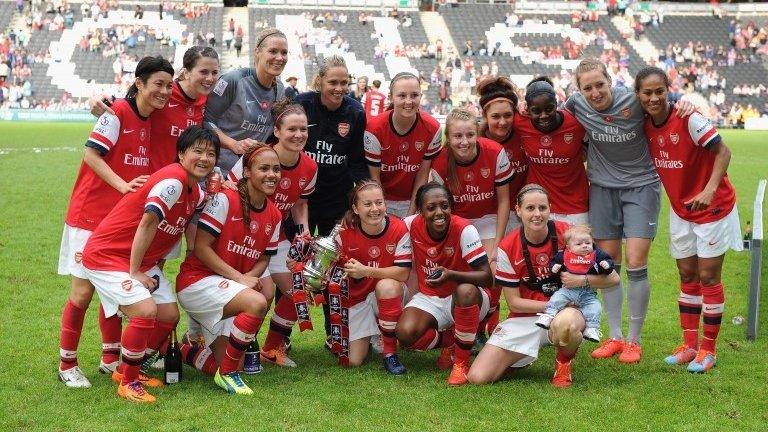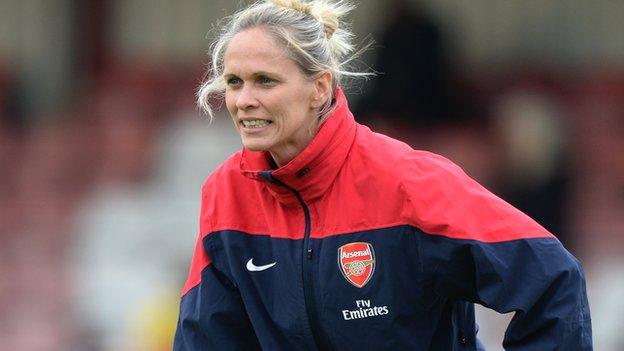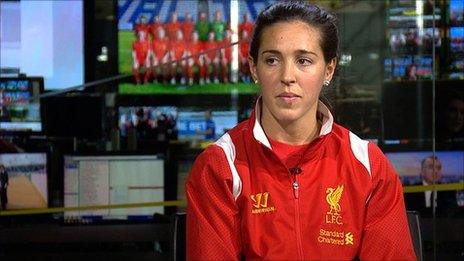England midfielder Fara Williams: I was homeless for six years
- Published
How football helped homeless Fara Williams
Sceptics of the old adage "sport changes lives" need look no further than England footballer Fara Williams.
Football took Williams from budding starlet, bursting on to the international scene at just 17 years old in 2001, to seasoned old hand, where she is now just a handful of matches away from being England's most-capped player ever.
She has battled her way to becoming one of the finest midfielders in the world. And she did it while being homeless.
For six years the now 30-year-old balanced living rough and in hostels with impressing on the football pitch. Many of her team-mates were none the wiser.
"I just didn't want to tell people," Williams reveals to BBC Sport - the first time she has spoken publically about being homeless. "People have a judgement of who should be homeless and who shouldn't, and I felt people would judge me.
"I put on a brave face and lived my life as a normal person would, as though I was living at home."
The Liverpool Ladies player, who left previous club Everton in 2012, was homeless during much of her early career, celebrating her 18th and 21st birthdays in hostels.
"The cause of most homelessness, which people aren't aware of, is family breakdown - it's not just addictions, that's just what people turn to [as a result of being homeless].
"People are mainly scared of the homeless they see on the streets. They're intimidated by them but they're normal people with problems. We all have problems," she adds.
Williams' experiences led her to work with the Homeless FA,, external where she coaches homeless girls and women every week.
It is clear during a training session at Manchester United's Cliff Ground that Williams enjoys her role. A smile rarely leaves her face as she delivers a session on ball control. The homeless players respond to her instructions with gusto, a few even attempting cheeky Cruyff turns to impress her.
"To have the opportunity to help these girls is something that I didn't want to turn down. I wanted to share my story with them and show them that there is a pathway to get out of the situation they're in," Williams explains.
"It's hard because you feel sorry for yourself [when you're homeless]. You feel like no one's there for you. I had football as my motivation, but some of these [people that I coach] don't have any motivation. I try to show them that there are people out there that want to help them, but also they've got to help themselves.
"It's just getting them out of the hostel environment, showing them that there is a different way, letting them have a bit of fun and interacting with different people."
Since 2012 the Homeless FA charity has used football to empower, and change the negative public perception of the issue.
Williams explains Merseyside switch
Head of the charity Gareth Parker, who also helped found the organisation, explains: "We prefer to use the term 'people experiencing homelessness' rather than 'homeless people,' so it doesn't sound like an ailment.
"Fara is of integral importance to us. For us to have a patron who isn't just an incredible sportsperson but who can connect with our cause and players is invaluable."
As well as football coaching, the players work towards a sports leaders qualification, which has brought about positive results.
The Homeless FA's research shows that all of the players involved report increased confidence levels; half of those using substances stop completely by the end of their time with the organisation; and 58% improve their housing situation.
At the end of the five-week course, some of the players are chosen to represent England in the Homeless World Cup. But the selections are based on a player's progress during the course rather than their ability.
"There's a few girls here that have been to the World Cup and are now working as volunteers for the Homeless FA," Williams says. "They're the ones that want to make a change."
Some of the women and girls have even returned from the World Cup determined to be the next Fara Williams and joined their local clubs. "I don't think it should matter what your background is," adds Williams. "For me, you can do it no matter where you live. I've been there, done it and I'm in a better place for it."
Williams has been selected for England in the forthcoming World Cup qualifiers, external - as the Lionesses aim to keep their undefeated record intact against Belarus and Ukraine. With 127 caps to her name, she is just three games away from becoming England's most-capped player.
"It will be a massive achievement for me," she says. "Rachel Yankey, who is current most-capped player, I remember being a little girl seeing Rachel and she has definitely inspired many girls over the years. To be someone like that would be an absolute honour."
You can watch the full Fara Williams interview during the FA Women's Cup final coverage on BBC Two on Sunday (16:15 BST).
- Published1 June 2014

- Published29 May 2014

- Published21 March 2013
